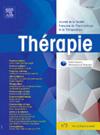Pharmacogénétique de l’ototoxicité des aminosides : état des connaissances et des pratiques – recommandations du Réseau francophone de pharmacogénétique (RNPGx)
IF 2.2
4区 医学
Q3 PHARMACOLOGY & PHARMACY
引用次数: 0
Abstract
L’administration d’aminosides peut provoquer une néphrotoxicité ou une ototoxicité, contrôlables par un suivi thérapeutique pharmacologique. Néanmoins, une prédisposition génétique liée à des variants du gène mitochondrial MT-RNR1, peut favoriser la survenue d’une ototoxicité dès les premières administrations. Des recommandations d’analyse pharmacogénétique ont été proposées récemment par le Clinical Pharmacogenetics Implementation Consortium (CPIC). Le Réseau francophone de pharmacogénétique (RNPGx) propose une revue bibliographique de cette prédisposition génétique, ainsi que des recommandations professionnelles. Le gène MT-RNR1 code pour l’ARNr 12S mitochondrial, qui constitue la petite sous-unité du ribosome mitochondrial. Trois variants de ce gène sont associés à une ototoxicité des aminosides : les variants m.1555A>G et m.1494C>T disposent d’un niveau de preuve « élevé », alors que le variant m.1095T>C dispose lui d’un niveau de preuve « modéré ». La recherche de ces variants peut être réalisée en laboratoire si l’administration d’aminosides peut être différée après l’obtention du résultat. En revanche, si le traitement revêt un caractère d’urgence, il n’existe actuellement pas de test rapide disponible en France, alors qu’un test « point-of-care » est autorisé en Grande-Bretagne. Le RNPGx considère (1) comme « indispensable » la recherche des variants m.1555A>G, m.1494C>T et « conseillée » celle de m.1095T>C avant l’administration d’un aminoside (si compatible avec le contexte médical). À noter que le niveau d’hétéroplasmie détecté ne modifie pas la recommandation ; (2) l’analyse pharmacogénétique n’est actuellement pas envisageable pour une administration d’aminosides à court terme, en l’absence de solution analytique disponible (test rapide à évaluer en France) ; (3) la réalisation d’une analyse rétrospective en cas d’ototoxicité des aminosides est « recommandée » ; (4) l’analyse des apparentés est « recommandée ». Le RNPGx propose ainsi une revue actualisée du couple gène – médicament, MT-RNR1-aminosides, pouvant servir de base à une adaptation des pratiques concernant l’analyse pharmacogénétique liée au traitement par aminosides.
The administration of aminoglycosides can induce nephrotoxicity or ototoxicity, which can be monitored through pharmacological therapeutic drug monitoring. However, there are cases of genetic predisposition to ototoxicity related to the MT-RNR1 gene, which may occur from the first administrations. Pharmacogenetic analysis recommendations have recently been proposed by the Clinical Pharmacogenetics Implementation Consortium (CPIC). The Francophone Pharmacogenetics Network (RNPGx) provides a bibliographic synthesis of this genetic predisposition, as well as professional recommendations. The MT-RNR1 gene codes for mitochondrial 12S rRNA, which constitutes the small subunit of the mitochondrial ribosome. Three variants can be identified: the variants m.1555A>G and m.1494C>T of the MT-RNR1 gene have a ‘high’ level of evidence regarding the risk of ototoxicity. The variant m.1095T>C has a ‘moderate’ level of evidence. The search for these variants can be performed in the laboratory if the administration of aminoglycosides can be delayed after obtaining the result. However, if the treatment is urgent, there is currently no rapid test available in France (a ‘point-of-care’ test is authorized in Great Britain). RNPGx considers: (1) the search for the m.1555A>G, m.1494C>T variants as ‘highly recommended’ and the m.1095T>C variant as ‘moderately recommended’ before the administration of an aminoglycoside (if compatible with the medical context). It should be noted that the level of heteroplasmy detected does not modify the recommendation; (2) pharmacogenetic analysis is currently not feasible in situations of short-term aminoglycoside administration, in the absence of an available analytical solution (rapid test to be evaluated in France); (3) the retrospective analysis in case of aminoglycoside-induced ototoxicity is ‘recommended’; (4) analysis of relatives is ‘recommended’. Through this summary, RNPGx proposes an updated review of the MT-RNR1-aminoglycoside gene-drug pair to serve as a basis for adapting practices regarding pharmacogenetic analysis related to aminoglycoside treatment.
[氨基糖苷类药物耳毒性的药物遗传学:法语国家药物遗传学网络(RNPGx)的建议]。
氨基糖苷类药物可诱发肾毒性或耳毒性,可通过药物治疗药物监测进行监控。不过,也有与 MT-RNR1 基因有关的耳毒性遗传易感性病例,这种情况可能在首次用药时就会出现。临床药物遗传学实施联合会(CPIC)最近提出了药物遗传学分析建议。法语国家药物遗传学网络(RNPGx)提供了有关这种遗传倾向的文献综述以及专业建议。MT-RNR1 基因编码线粒体 12S rRNA,它构成线粒体核糖体的小亚基。目前可确定三种变体:MT-RNR1 基因的变体 m.1555A>G 和 m.1494C>T 在耳毒性风险方面的证据等级为 "高"。变体 m.1095T>C 的证据等级为 "中度"。如果在获得结果后可以推迟氨基糖苷类药物的使用,则可以在实验室中对这些变异体进行检测。但是,如果需要紧急治疗,目前在法国还没有快速检测方法("护理点 "检测已在英国获得授权)。RNPGx 认为:(1) 在使用氨基糖苷类药物前(如果符合医疗环境),"强烈建议 "检测 m.1555A>G、m.1494C>T 变体,"适度建议 "检测 m.1095T>C 变体。需要注意的是,检测到的异质性水平并不会改变建议;(2) 由于缺乏可用的分析解决方案(法国将对快速检测进行评估),在短期使用氨基糖苷类药物的情况下,药物基因分析目前尚不可行;(3) "建议 "对氨基糖苷类药物引起的耳毒性进行回顾性分析;(4) "建议 "对亲属进行分析。通过本摘要,RNPGx 建议对 MT-RNR1- 氨基糖苷类药物基因配对进行更新审查,作为调整与氨基糖苷类药物治疗相关的药物基因分析实践的基础。
本文章由计算机程序翻译,如有差异,请以英文原文为准。
求助全文
约1分钟内获得全文
求助全文
来源期刊

Therapie
医学-药学
CiteScore
3.50
自引率
7.70%
发文量
132
审稿时长
57 days
期刊介绍:
Thérapie is a peer-reviewed journal devoted to Clinical Pharmacology, Therapeutics, Pharmacokinetics, Pharmacovigilance, Addictovigilance, Social Pharmacology, Pharmacoepidemiology, Pharmacoeconomics and Evidence-Based-Medicine. Thérapie publishes in French or in English original articles, general reviews, letters to the editor reporting original findings, correspondence relating to articles or letters published in the Journal, short articles, editorials on up-to-date topics, Pharmacovigilance or Addictovigilance reports that follow the French "guidelines" concerning good practice in pharmacovigilance publications. The journal also publishes thematic issues on topical subject.
The journal is indexed in the main international data bases and notably in: Biosis Previews/Biological Abstracts, Embase/Excerpta Medica, Medline/Index Medicus, Science Citation Index.
 求助内容:
求助内容: 应助结果提醒方式:
应助结果提醒方式:


